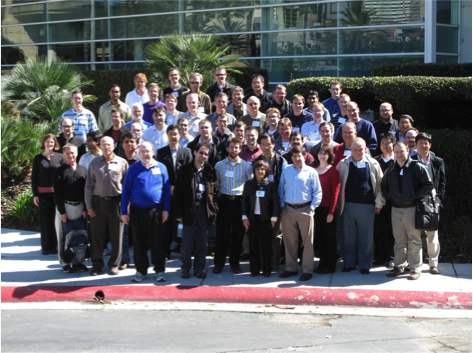KIM Inaugural Meeting held in San Diego
01-Mar-2011The Knowledgebase of Interatomic Models (KIM) project had its Inaugural Meeting in San Diego, California, during February 26-27, 2011, under the auspices of the TMS 2011 Annual Meeting & Exhibition. The KIM project is based on a four-year NSF cyber-enabled discovery and innovation (CDI) grant and has the following main objectives:
- Development of an online resource for standardized testing long-term warehousing and easy retrieval and use of interatomic models (potentials and force fields) and data.
- Development of an application programming interface (API) standard for atomistic simulations, which will allow any interatomic model to work seamlessly with any atomistic simulation code.
- Fostering the development of a quantitative theory of interatomic model transferability to provide guidance for selecting application-appropriate models based on rigorous criteria, and error bounds on results.

The KIM Inaugural Meeting was attended by 63 participants from 7 countries (Canada, Germany, Japan, South Korea, Sweden, UK and the US) and included many of the key interatomic potential and molecular dynamics code developers. (A list of attendees appears at the end of this message.) The objectives of the meeting were two-fold. First, to clearly define the goals and structure of the KIM project based on the needs of the atomistic simulation community, and second to obtain the community’s endorsement of KIM. The event was highly successful on both counts.
The activities in San Diego revolved around the creation of a Requirements Document (RD) for KIM. RDs are common in industry where they are used to fully define all aspects of new products during the development stage. The KIM RD addresses four main aspects of the project:
- governance of KIM including issues related to intellectual property rights,
- the KIM API,
- the web portal for accessing KIM content, and
- provenance and standards issues needed to ensure the quality of KIM content.
The participants divided into four committees to study these topics in depth. The committees reviewed a draft RD, line by line, and reworded it as necessary. The atmosphere throughout this process was very positive, despite the fact that some of the debates (especially in the API committee) were intense. In the end, a consensus was reached on almost all points that were discussed. The RD, created through this process, will serve as a living document that will accompany the KIM project as it develops. This document will be placed online at https://openkim.org, where anyone interested in atomistic simulations will be able to comment and provide feedback.
As part of the process described above, a KIM Board was defined with the responsibility of making strategic decisions about the operation of KIM. Three participants, Prof. Michael Baskes (UCSD/LANL), Prof. Susan Sinnott (U. Florida) and Dr. Chandler Becker (NIST), were unanimously elected to serve as an interim KIM Board and Nominating Committee with the responsibility of suggesting additional board members to be voted on by all KIM registered users. In addition, Prof. Ellad Tadmor (U. Minnesota) was unanimously elected to be the KIM Director in charge of the development of the KIM project and its day-to-day operations.
In a continuation of this collaborative spirit, at the end of the meeting, the participants unanimously voted to accept the following resolution:
San Diego KIM Inaugural Meeting Resolution
The assembled at the KIM Inaugural Workshop in San Diego, CA Feb. 26-27, 2011, support the efforts of the KIM project to develop open standards and software for the atomistic simulation community. These include:
- an application programming interface (API) standard for calling interatomic models,
- methodologies for defining properties computed in atomistic simulations enabling their comparison with reference data,
- formats in which interatomic models, simulation codes that compute standardized properties, and properties data are stored and accessed.
This forum also recognizes the benefit of having interatomic models archived subject to provenance and quality controls.
There was true sense of excitement in San Diego regarding the emergence of KIM and the possibility that atomistic simulations were entering a new era of cooperation and standardization.
|
Karsten Albe (Darmstadt) Michael Baskes (UCSD) Chandler Becker (NIST) Jim Belak (LLNL) Noam Bernstein (NRL) Peter Brommer (U. Montreal) Benjamin Burton (NIST) Adam Cadien (George Mason U.) Marc Cawkwell (LANL) Michael Chandross (Sandia) Shao-Ping Chen (LANL) Ioana Cozmuta (NASA) Gabor Csanyi (Cambridge) Avinash Dongare (ARL) Ryan Elliott (U. Minnesota) Paul Erhart (LLNL) Diana Farkas (Virginia Tech) Michael Fellinger (Ohio State) Tim Germann (LANL) Mark Gilbert (CCFE) Peter Gumbsch (Fraunhofer) Thomas Hammerschmidt (Rhur) Dan Karls (U. Minnesota) Gerhard Klimeck (Purdue) Byeong-Joo Lee (Pohang U.) Tom Lenosky (consultant) Ju Li (U. Penn) Yi-Shen Li (U. Penn) Erik Lindahl (Stockholm) Yi Liu (Caltech) Daniel Mason (Imperial) Ronald Miller (Carleton) |
John Mintmire (Oklahoma State) John Moriarty (LLNL) James Morris (ORNL/U. Tenn) Hyoungki Park (Ohio State) Lars Pastewka (Johns Hopkins) Sandeep Patel (Delaware) Steven Plimpton (Sandia) Johannes Roth (ITAP) Paul Saxe (Material Design) Hannes Schweiger (Materials Design) James Sethna (Cornell) Sadasivan Shankar (Intel) Ashvini Shekhawat (Cornell) Susan Sinnott (Florida) Valeriu Smirichinski (Minnesota) Srini Srivilliputhur (UNT) Steven Stuart (Clemson) Ellad Tadmor (U. Minnesota) Aidan Thompson (Sandia) Ilian Todorov (Daresbury) Dallas Trinkle (Illinois) Mark Tschopp (Mississippi) Yoshi Umeno (Tokyo) Steven Valone (LANL) Adri van Duin (Penn State) Vaclav Vitek (U. Penn) Arthur Voter (LANL) Greg Wagner (Sandia) Chris Weinberger (Sandia) Xiaowang Zhou (Sandia) Jonathan Zimmerman (Sandia) |